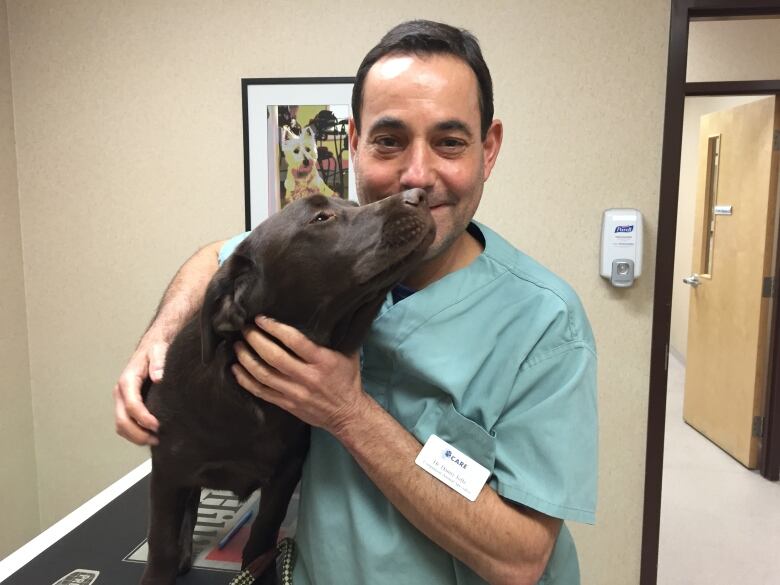More Calgary pet owners not vaccinating their dogs
Veterinarians say unprotected pets not only a risk to themselves, but other dogs too

Some Calgary veterinarians say they're treating more cases of canine parvovirus - a life threatening illness among dogs - that can be prevented by regular vaccinations.
The isolation room at the Fish Creek Pet Hospital has been full of dogs battling parvovirus, a highly contagious infection,Dr.KatieVanSluyssays.
"Really, because this disease is so preventable from vaccines, we shouldn't have to worry about it," said Van Sluys. "It's sad."
Parvovirus, or Parvo for short,is either spread by directcontact with an infected dog, or indirectly, by the fecal-oral route.
Its symptoms include vomiting, diarrhea, fever and general weakness. It can also lead to dehydration, which if severe enough, can causedeath.
There is a vaccine that is highly effective and is usually included as part of a dog's regular shots.
Anti-vaxxer movement
But Dr. Van Sluys saysa trend is emerging among pet owners who are choosing not to vaccinate their dogs, similar to the anti-vaccine movement with respect to human vaccines.

"We do see more people thinking that vaccinations are not important or that they come with risks and I am not doing that to my dog. But unfortunately the risk of this disease is out there and threatening the adultpopulation, if you are not vaccinated."
Van Sluys says anti-vaxxersare relying on what's called, herd immunity, that is, as long asa certain percentage of the dog population is vaccinated, the disease has a harder time spreading.
Dr.Danny Joffe, the medical director at the Care Centre Animal Hospital, says these decisions arebeing driven a lot by unresearched opinions on the internet.
"Are vaccines innocuous? No. They are biological and they can cause side effects just like they can in people. But for most patients, and again this should be assessed by your veterinarian,butin most cases, the benefits of vaccinatingfar,far, faroutweigh any risks of giving the vaccine."
Even coyotesat risk
Asthe population of unvaccinated dogs grows in Calgary, Dr. Joffe saysthe disease will become more prevalent, even affecting vaccinated dogsespecially those with weaker immune systems which didn't respondwell to the vaccine.
"It puts the entire canine population at risk. And in a city like Calgarywhere we havea large urban coyote population as well, which also pick up these samediseases, it just ends up causinga snowball effect," said Joffe.
Until now, the disease was usuallyfoundin puppies, who were not fully protected against the disease. ButDr. Van Sluys says its becoming more common to see it in adultdogs, which can catch staff off guard.
"It's really unfortunate when you have a vomiting three-year-old Labrador. In most people's minds, that's a foreignbody, [they've]eatena rock or a sock," said Sluys.
"It's really unfortunate situationwhen you make a diagnosis of parvoin surgery."
Cost of vaccine vs. treatment
Pet owners should also consider the cost involved of treating this particular disease, saysDr. Van Sluys.
She says parvo-dogs can be in the hospital anywhere from a couple ofdays to a couple of weeks.
"A very intense therapy, which can be challenging for some ownersto face... avaccine versus a $2,000 vet stay."
The parvo-vaccine is usually given in combination with one for distemper, and it is recommended for puppies at 8, 12, 16 weeks, again at 18 months, and then every three years afterwards.












_(720p).jpg)


 OFFICIAL HD MUSIC VIDEO.jpg)
.jpg)



























































































